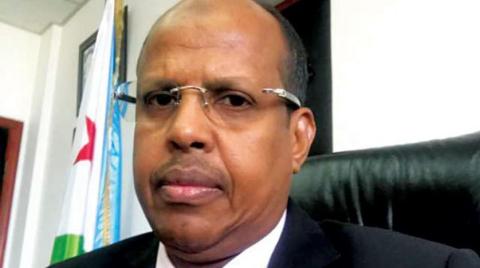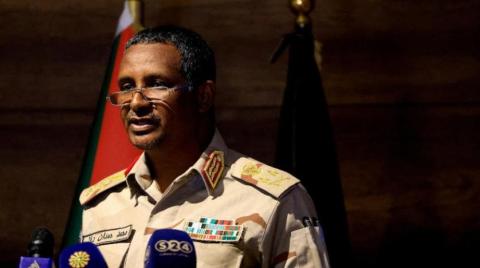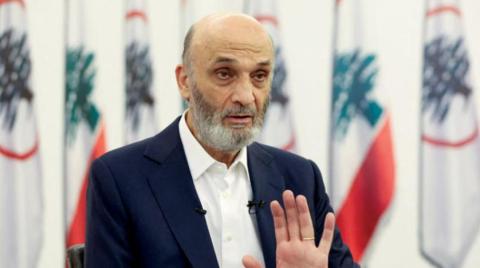
At around 5:00 am, retired Lieutenant General Abhijit Guha, head of the United Nations Mission in Support of the Hodeidah Agreement, awakes aboard a ship anchored off the coast of Yemen’s port city of Hodeidah. He kicks off his day with exercise and calls it a day at 9:00 pm after a long day spent with his team aboard the Arctic Dream to ensure the Hodeidah Agreement holds.
It is often difficult to come up with attractive headlines after an interview with a UN official, but Guha’s statements can be described as frank compared to his counterparts. He is frank in saying the withdrawals - or rather their official name, redeployment - “would only be possible once the issue of the local security force is politically discussed and resolved.”
Guha spoke to Asharq Al-Awsat in his first interview since his appointment to his position in October. It is the first such interview for any “Hodeidah general” since his predecessors Patrick Cammaert and Michael Lollesgaard. Guha said Yemen has been at a “crossroads”, whether at the crossroads between civilizations or in the middle of the spice trade in later times and that “it has always been at the hub of the affairs. So, Yemen to me is like a laboratory of the world in many ways.” He added that the Yemeni “people brought us into this world. It was through you that humanity spread. And we owe it to you to give you peace.”
Q: Let’s start with the outcome of the 7th joint Redeployment Coordination Committee (RCC) meeting, as this was the first joint meeting you chair. What do you think about this meeting, and of its outcome?
A: Though this is my first meeting as such, its not that I do not know what had happened before because everything is always documented. So, I had a very good idea of the process, even before I actually attended it myself.
The aim of this meeting was to facilitate the operational steps of redeployment, including all preparations before the redeployment, during its implementation, and after it is completed. To come to this point, I am actually encouraged by the initial responses that I have got from both parties. I now propose to move between Mocha and Sanaa in the next few weeks to finalize issues, so that a common military concept of operations for the redeployment process can be constructed. Of course, the actual redeployment would only be possible once the issue of the local security force is politically discussed and resolved.
But in addition to this, there was another important aspect that we were trying to follow, and that was to ensure that the military aspects of opening humanitarian access across frontlines, which include the best routes for humanitarians, and also the safety and security of both their convoys and personnel, how that was to be facilitated by us. We have generally found that people are most keen on this (facilitating humanitarian access), and I am sure that this movement would be possible in a more regulated way, not that its not happening now, but it will be happening in a more regulated way.
The third issue is the issue of improving movement of civilians across frontlines. This is an issue which both sides have shown keenness about, and Im sure we will be able to implement this also in due course.
Q: The press statement you issued after the last meeting mentioned “formalizing the CONOPs (Concept of Operations) for the redeployment process”, does that mean that the first redeployment that the Houthis carried out in May is still credible? Or do you need to redo the whole process, starting with the political than implementing on the ground?
A: I think, what you are saying - if I understand right - is that there was an agreement. The agreement required people to move out of certain places by a certain time. That was specified in the agreement.
Now, what I am saying is that the unilateral withdrawal was a step towards the overall aim. But, however, for the redeployment as agreed to in the Hodeidah Agreement, it requires a comprehensive concept of operations to ensure full implementation, and thats what we want, isnt it?
And for that full implementation, we require both parties to be ready to do it, and a military concept of operation which is agreed to by both sides to be able to achieve it. And of course, underlying all this is also a political agreement between the two parties to make it happen. So, that is what we are now moving towards. The RCC and UNMHA is an entity which is tasked to oversee this process.
Q: And are you discussing this, sir, with both sides in the next few months?
Not next few months, actually the next few days. The military concept of operations is going to be discussed in detail by me, after the initial presentations (which took place during the 7th joint meeting of the RCC), both in Mocha and in Sanaa, so that we arrive at a conclusion and I can write the actual concept of operations.
Q: And what about the issue of the local security forces? How do you think it can be resolved? Because both sides are explaining the agreement by their own interpretation of this issue?
A: To me, the issue of the local security force is one of a political nature, and will have to be resolved by the political leadership of both parties. And I feel when the moment is right, they would resolve this issue. But till then, it is incumbent on me to prepare and be ready for it by having a concept of operations to be followed when this time comes.
Q: There is a lot of criticism directed at the UN for not declaring the party who is obstructing the redeployments in Hodeidah. What do you think about this?
A: I would like to say, that you must understand the UNs role. The UN role is to work with both parties towards full implementation. That is what we intend to do. And I also see that despite difficulties, both parties have shown keenness and commitment towards this process. Our duty is to stay the course, and help bridge the gap wherever necessary and to implement the redeployment in a very satisfactory way to both parties, and of course, most importantly, to the people of Yemen.
Q: But both parties exchange accusations that the other party is the one, violating the ceasefire, and delaying the full implementation of the Hodeidah Agreement. What is the role of UNMHA and RCC in this regard?
A: Thank you for your question. Now, I would like to stress that both parties have always committed principally to adhere to the ceasefires. That said, it cannot be denied that there is a lot of mistrust as a result of the long conflict. However, I would bring to your notice that since the agreement was signed, there has been no offensive. And I believe both parties are sincere in their hope to end the war. So, all of this gives me a lot of hope. Over the last three months I have watched the Liaison Officers from both sides, who have been operating in the Joint Operations Center (of the Ceasefire Enhancement and De-escalation Mechanism) to ensure de-escalation. I would say, as a result of this as well as the establishment of the five joint Observation Posts around Hodeidah city, three months back, we have achieved significant de-escalation, as compared to what it would prior to this. So, there is great hope as far as Im concerned.
Q: What about the freedom of movement of UNMHA?
A: I would say that we are working in a very challenging operational environment, that is part of the active conflict thats going on. We do feel that there is a space for improvement, for which we feel parties would need to keep facilitating our mission and our operations.
Q: what about the current number of UNMHA staff and observers who are currently based in Hodeidah? How many of them are currently on the ground? Because we knew that it should be around 75 (military/police observers) if Im right?
A: I think youve got your figures absolutely right. The core element of our staff is actually the military and police observers that we are supposed to have, and it is to be capped at 75.
Q: But do you have 75 on the ground?
A: No. It would be wrong for us to have 75 at this moment because this is what is required for the redeployment process. We havent reached that as yet, and therefore we are increasing it as we are moving towards the process.
Q: But are there challenges with the logistics? What we here is that the Yemeni Government is facilitating visas and other logistics for UNMHA staff, but we are told the case is different with the de-facto authorities in Sanaa. Have you faced any challenges with the logistics for your staff to arrive in Sanaa?
A: The process is a lengthy one, but I have had no problems in maintaining the numbers that I require. Currently we are around 75 in total, both international civilian staff and observers. But we are increasing every month and, we aim to move towards a figure of approximately a little over 130 by the time redeployment comes.
Q: How do you manage the day to day operations aboard the UN flagged vessel? Is it anchored or does it sail from time to time?
A: We have the UN-flagged ship where we stay and operate. This is berthed in Hodeidah Port. We do sail from time to time, when we have joint meetings of RCC meetings, as we have been holding the meetings in international water.
Q: How does your daily routine in Hodeidah look like?
A: Well, I think Im a military guy, so it hasnt changed very much over the years, although I am now a retired military guy. But, I wake up pretty early in the day; at around 5:00 am, I do my exercises, then I have an early breakfast, and get down to work, the whole day, and get ready to sleep by around 9:00 pm. But depending on the work, I keep receiving and getting calls and if there is something happening and I need to intercede, then I stay up and work til the work ends. That is basically how everybody works onboard our ship.
Q: Do you work closely with the UN Special Envoy Martin Griffiths?
A: Yes. We work in a very close connection with each other, because whatever we are doing has a common purpose, so we are in constant touch.
Q: What kind of books are you reading these days?
A: Im currently reading “The Rise and Fall of Great Powers” by Paul Kennedy.
Q: Did you bring other books with you?
A: Nowadays you do not need to carry (hard copies) books with you, you can get whatever you want electronically, and that is what I do.
Q: Who is your favorite historically Yemeni figure?
A: Actually, Im a bit of a history buff. And to me Yemen is very very interesting. It was at the crossroads of civilizations, or intact, also of humanity. It was through the horn of Africa into Yemen that humans then moved East and West to populate the rest of the world. So, Yemen is the font of civilizations, as we understand it today.
Yemen has been at that crossroads, whether at the crossroads between civilizations; which were further East and the river valleys of Mesopotamia and Egypt, or in the middle of the spice trade in later times. Moreover, it has always been at the hub of the affairs. So, Yemen to me is like a laboratory of the world in many ways.
I would love to see what is believed to be the first irrigation system in the world. It is believed to be from a dam which was constructed about 2,600 – 2,700 years back. It first came up in Yemen. I would like to see the remains of that. Its based in the South. The Saba Kingdom.
Q: Finally, what is your message to the Yemeni people?
A: I think my message to them is that you are the people who brought us into this world. It was through you that humanity spread. And we owe it to you to give you peace.












